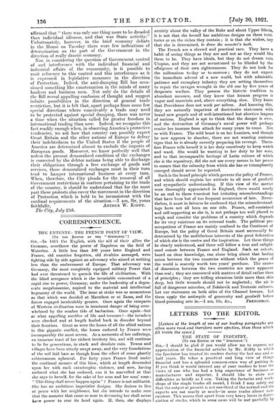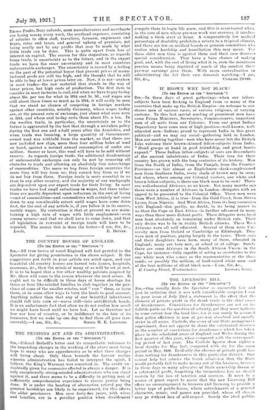LETTERS TO THE EDITOR.
[Letters of the length of one of our leading paragraphs are often more read,and therefore more effective, than those which fill treble the space.] THE STATE OF INDUSTRY.
[TO THE EDITOR OP THE "SPECTATOR."]
Sin,—I should be glad if you would allow me to express may appreciation of the financial articles by Mr. Kiddy to which the Spectator has treated its readers during the last one and ii- half years. He takes a practical and long view of things financial and has a splendid common-sense way of putting it. If you think it would interest any of your readers to hear the views of one who has had a long experience of business as manufacturer and exporter, I should like to state our difficulties as briefly as I can. Taking the factories and work- shops of the staple trades all round, I think I may safely say that the output at present is not one-third of the normal and time exports are not nearly as much—in some trades almost non- existent. This means that apart from very heavy losses in depre- ciation of sto.-..ks, which in some cases will be met partially by
Excess Profits Duty refunds, most manufacturers and merchants are losing money every week, the overhead expenses, consisting of salaries to office staff, travellers, foremen, enginemen and firers, rates and taxes, and general upkeep of premises, not being nearly met by any profits that may be made by what little trade can be done. This is quite apart from loss of interest on capital. The reason for this stagnation, as regards home trade, is uncertainty as to the future, and in the export trade we have the same uncertainty and in most countries unfavourable exchanges. The uncertainty is caused by a feeling on the part of the potential buyer that present prices of manu- factured goods are still too high, and the thought that he will be able to buy at lower prices later on. Now, it is not—anyhow in most trades—the raw material that stands in the way of lower prices, but high costs of production. The first item to consider in most factories is coal, and when we have to pay to-day about 35s. per ton for what in 1914 cost 5s. 3d., and wages are still about three times as much as in 1914, it will easily be seen that we stand no chance of competing in foreign markets against other countries, notably Germany, whose wages to-day are, at the present rate of exchange, just about what ours were in 1914, and whose coal to-day costs them about 17s. a ton. In the woollen trade, in particular, the uncertainty as to the future is aggravated by the fact that through a mistaken policy daring the first one and a-half years after the Armistice, and when trade was booming, a large quantity of Government- owned wool was withheld from the market, so that there are now included new clips, more than four million bales of wool on band, against a normal annual consumption of under one million. Sooner or later, this wool will have to be sold without reserve. As regards foreign trade, the additional disadvantage of unfavourable exchanges can only be met by removing all obstacles to trade and allowing an absolutely free interchange of commodities. The more we buy from foreign countries the more they will buy from us; they cannot buy from us if we do not buy from them. Foreign trade is more essential to us than to any other country, and the majority of our workpeople are dependent upon our export trade for their living. In most trades we have had small reductions in wages, but these reduc- tions aresnostly dependent upon reduction in the cost of living —cost of commodities—and commodities will certainly not come down to any considerable extent until wages have come down first, for the cost of any article is, if you follow it to its source, mainly wages. My contention is that at present we are main- taining a high rate of wages with little employment—even among miners—and that we shall have to come down, and that all legislation in restraint of foreign trade will have to be repealed. The sooner this is done tho better.—I am, Sir, ite.,



































 Previous page
Previous page